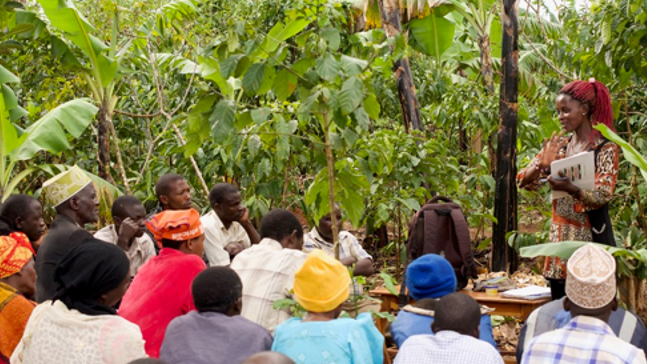Average crop yields in much of Africa lag far below their agronomic potential. This is the case for coffee grown by smallholders in Uganda—agronomy experts estimate they could more than double their yields by applying optimal management practices. Increased coffee production is a key strategy of the government of Uganda for boosting both national earnings of foreign exchange and improving the livelihoods of the country’s 1.8 million small-scale coffee farmers, who produce nearly all of the country’s coffee.
A new IFPRI study finds that providing agronomy training to farmer groups and disseminating recommendations via mobile phone can be a cost-effective way of achieving this target.
We evaluated impacts of two in-person coffee agronomy training programs implemented in Uganda by Hanns R. Neuman Stiftung and TechnoServe, as well as complementary and stand-alone phone-based advisory services implemented by Precision Development, through a randomized controlled trial conducted from 2019 to 2023. In-person training sessions, usually in groups but sometimes one-on-one with farmers due to COVID-19 restrictions, were conducted approximately monthly over a period of 26 months. In addition, Precision Development sent farmers recorded voice messages containing recommendations for improving coffee cultivation that they could also access on demand via a toll-free number. Content of both training and recorded messages included advice on how to rejuvenate coffee trees; manage soil, water, shade and nutrients; and control weeds, pests and plant diseases.
To measure impacts on farmers’ coffee practices, we conducted direct observations on 3,739 farms in 360 villages across six districts in western Uganda where training was offered, and 3,496 farms in 360 nearby control villages. Observations occurred just over a year after the end of in-person training.
To assess yield effects, we harvested the coffee from three trees per farm just before the second major harvest after the end of training. Harvesting was conducted by researchers rather than by farmers in order to ensure uniformity of yield data. Trees were identified by one team according to a standard protocol and harvested by a separate team to avoid the risk that data collectors might select smaller trees to minimize their workload. Direct observation methods were used because of the concern that farmers who had received the interventions could over-report adoption of recommended practices and overstate and yields to show they were make the most of the training they had received. Yield measurement methods were refined through extensive pilot testing.
Pooling the sample across regions and training implementers, coffee yields of farmers in villages where in-person training was offered were 7% higher overall than in control villages at two years post-training. In one of the regions the average impact reached 10.5%. Because each implementer worked in a distinct region, it’s not possible to say whether the higher impact was due to regional characteristics or to the specifics of the training programs. Further, as not all farmers attended training, yield effects on trained farmers could have been as high as 18%.
Translating yield gains into a financial return on investment, we calculate an annual ROI of between 15% and 44%, depending on the region and training implementer. Assuming a level of persistence observed for coffee practices in previous evaluations, we estimate that agronomy training more than pays for itself over time, and can be a cost-effective approach to improving the incomes of smallholder coffee farmers.
Impacts of the in-person training programs evaluated through this study were likely dampened by COVID-19 restrictions that interrupted the training for months at a time and limited training to one-on-one farm visits or smaller group sessions for much of the intervention period, reducing the amount of content on which farmers were trained.
Detecting impacts of the phone-based interventions was more challenging, as these approaches lead to more modest behavior changes, albeit at far lower cost. Using the imprecisely estimated impacts of the phone-based interventions, and projecting yield based on farm practices, we calculate annual ROIs for these of between 225% and 335%, assuming they are deployed at a scale of one million farmers.
The results of this evaluation indicate the extent to which agronomy training can boost crop yields and increase rural incomes. Governments of coffee-growing countries and other stakeholders can use these results to inform their strategies for expanding coffee production and improving the lives of farm families.
Vivian Hoffmann is a Senior Research Fellow with IFPRI’s Markets, Trade, and Institutions Unit and an Associate Professor in the School of Public Policy and Administration and Department of Economics, Carleton University, This post is based on research that is not yet peer-reviewed.
Support for this research was provided by Benckiser Stiftung Zukunft (now the Alfred Landecker Foundation), Enveritas, Stichting Coffee Agronomy Training, and the CGIAR Research Program on Policies, Institutions, and Markets.
Referenced impact evaluation report:
Hoffmann, Vivian; Murphy, Mike; and Harigaya, Tomoko. 2024. Uganda coffee agronomy training: Impact evaluation report. Washington, DC: International Food Policy Research Institute. https://hdl.handle.net/10568/149080







